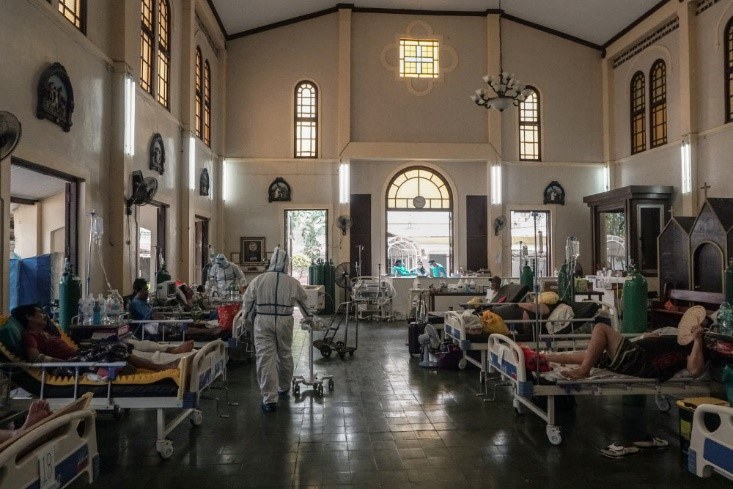Thailand Breaks 1M Mark for COVID Infections
2021.08.20
Bangkok and Manila
 A health worker gives a Buddhist monk a dose of the AstraZeneca COVID-19 vaccine in Bangkok, Aug. 20, 2021
A health worker gives a Buddhist monk a dose of the AstraZeneca COVID-19 vaccine in Bangkok, Aug. 20, 2021
Thailand surpassed the 1 million mark for COVID-19 infections on Friday, with 97 percent of those cases being recorded since April, health officials reported, as the country reels from a viral wave driven by the highly contagious Delta variant.
The Philippines, meanwhile, recorded its highest-ever daily caseload of coronavirus infections, officials said Friday, even as Metropolitan Manila and two nearby provinces were preparing to ease pandemic-related mobility restrictions to help the economy.
Thailand logged 19,851 new cases overnight to bring the cumulative tally to 1,009,710, according to the Center for the COVID-19 Situation Administration (CCSA), a government task force.
As many as 240 new deaths from the virus were also recorded, lifting the nationwide death toll to 8,826. Nearly 99 percent of all coronavirus deaths in Thailand also occurred since early April, officials indicated on Friday.
Thai hospitals have more than 200,000 patients to treat, 50,000 more than the nation’s capacity, according to the CCSA, chaired by Prime Minister Prayuth Chan-o-cha.
“There are more than 5,000 patients in critical condition. And over 1,000 are relying on respirators,” Dr. Apisamai Srirangsan, the CCSA deputy spokeswoman, told reporters in Bangkok.
Thais have harshly criticized Prayuth, a former junta chief, for his government’s response to the latest spike in infections in the country and its slow rollout of COVID-19 vaccines. The government’s perceived failure to contain the latest wave of infections has been at the core of recent anti-government protests, which have become more violent lately.
The prime minister did not issue a statement on Friday to mark the milestone of one million infections.
Meanwhile, the public health ministry announced that it had signed a deal to purchase another 10 million vaccine doses from Pfizer in addition to a first lot of 20 million, all to be delivered in the last quarter of 2021.
To date, Thailand has relied on AstraZeneca, Sinovac and Sinopharm to vaccinate its population. The United States donated 1.5 million doses of Pfizer at the end of July.
All told, the kingdom has vaccinated about 5.7 million people, or 8.6 percent of the total population, officials said. Meanwhile, a COVID-19 lockdown is in place in Bangkok and 28 other provinces.

Philippine medical front-liners treat patients suffering from the coronavirus disease inside a chapel in Quezon City that was converted into an Intensive Care Unit to help a local hospital deal with a surge in patients, Aug. 20, 2021. [Dante Diosina Jr./BenarNews]
The Philippines is also battling a spike in infections stemming from the Delta strain, which was first detected in India earlier this year.
On Friday, health officials reported 17,231 new COVID-19 cases during the previous 24 hours. The new figure eclipsed the previous daily record of 15,310 cases, set in early April.
The Philippines has recorded 1.8 million COVID-19 cases with a resulting death toll of 31,198 since the virus was first detected in the country early last year.
“COVID-19 cases may continue to rise in the coming days,” the health department said in a statement Friday.
The agency cautioned people to “follow minimum public health standards” such as wearing face masks and social distancing, and to get vaccinated, even as authorities loosen lockdowns in Metro Manila and the province of Laguna beginning Saturday. Bataan province will follow on Monday.
“The country cannot always rely on quarantine classifications as it is costly to the economy and livelihood of people. People need to return to a safer and smarter workplace, and act prudently,” the health department said.
In easing mobility restrictions, the government’s anti-COVID task force “decided that we all need to be strategic and purposive in our responses to control the further spread of COVID-19 and its variants,” said Harry Roque, the spokesman for President Rodrigo Duterte.
“Community quarantine is not the only solution to the pandemic,” he stressed.
Prolonged restrictions have taken a toll on the Philippine economy, which shrank by 9.5 percent in 2020, when large swathes of the country were put on lockdown for up to five months.
Yet, the economy grew by 11.8 percent from April through June compared with the same period a year earlier, despite worsening coronavirus conditions, government planners said earlier this month.
Metro Manila and its nearby provinces were under the strictest form of “community quarantine” over the past two weeks, after a private medical research group warned about a surge in infections caused by the Delta variant.
A short supply of vaccines and COVID tests as well as inefficiencies in contact tracing and isolating patients have strained the Philippines’ response to the pandemic.
As of Aug. 15, only about 11 percent of the country’s roughly 110 million people have been fully vaccinated against COVID-19, according to the government.
Only healthcare and frontline service workers, people with co-morbidities, the elderly, and Filipinos classified as poor or “indigent” are so far allowed to receive vaccines from the government.
The rollout has yet to cover the general population. Some private businesses have recently begun inoculating their employees and their families, but the majority of Filipinos may have to wait until 2023 to get a jab.
Dante Diosina Jr. contributed to this report from Manila.







